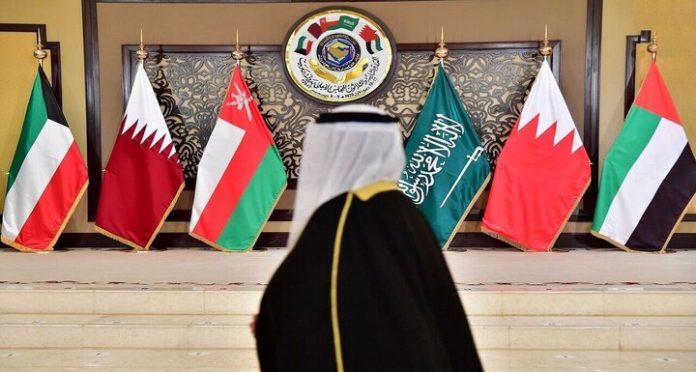Arab countries and mediation between Iran and the United States; a change in role-playing.
As geopolitical tensions between Iran and the United States escalate, the Gulf Cooperation Council (GCC) countries are adopting a pragmatic approach to play a mediating role in reducing tensions.
This strategy not only reflects these countries’ deep concern about the consequences of regional instability but is also closely tied to their long-term economic interests, especially in the context of development programs such as Saudi Arabia’s Vision 2030 and the UAE’s mega projects. Understanding the inherent relationship between regional stability and their economic security, the Gulf countries are seeking to become important players in managing the tensions in the region.
Key reasons for mediation: Economy, security, and avoiding the repetition of history
The mediation of the Arab Gulf countries in the Iran-US crisis can be analyzed along three main axes: First, the need to protect these countries’ ambitious economic projects, which are at risk with any escalation of regional tensions. For example, Saudi Arabia, which has defined the implementation of Vision 2030 as the axis of its domestic and international developments, is well aware that war or widespread instability can disrupt the flow of foreign investment and the development of non-oil sectors. The same logic is also observed in the United Arab Emirates, where Dubai, as a regional commercial hub, has always benefited from economic ties with Iran.
Second, historical lessons from neglect in past negotiations; the bitter memory of being left out of the JCPOA process in 2015 and disappointment with the lack of consultation by the US during the Biden era have led these countries to conclude that an active presence at the negotiating table guarantees the preservation of their interests.
Third, the paradigm shift in the foreign policy of these countries is from an ideological approach to pragmatism; so that even Saudi Arabia, which previously had a confrontational approach with Iran, has now given priority to de-escalation and becoming an effective middle power in global equations.
Saudi Arabia; From confrontation to targeted de-escalation
Riyadh, once known as the leader of the anti-Iran front in the region, has now shown that it has redefined its priorities by restoring diplomatic relations with Tehran in 2023. The shift is not just a tactical maneuver, but part of a larger strategy that sees economic development as the main driver of foreign policy. Saudi Arabia, which has hosted talks between Russia, Ukraine, and the United States, is seeking to play a similar role in the Iran case. However, Riyadh faces limitations, including its historical proximity to Washington, which may make Tehran suspicious of its neutrality. Nevertheless, the kingdom is trying to establish itself as a credible mediator.
Qatar; Multifaceted Diplomacy and Investment in International Credibility
Qatar, relying on a complex network of international relations and successful experience in hosting negotiations such as the Taliban-US or Hamas-Israel talks, has established itself as an unrivaled actor in mediation. Doha, which chose to resist pressure to cut ties with Tehran during the 2017 blockade crisis by its neighbors, is now using this decision as political capital.
Qatar’s role in the recent Iran-US prisoner swap agreement is a prime example of this strategy. Doha is in a unique position, hosting the largest US military base in the region while maintaining Tehran’s relative trust.
The United Arab Emirates: Economic Pragmatism and an Indirect Role
The UAE, particularly through Dubai, has consistently maintained its economic ties with Iran even at the height of political tensions. The country, which hosts tens of thousands of Iranian citizens and is a vital trade artery, cannot afford instability.
The delivery of Donald Trump’s letter to the Iranian leader by Anwar Gargash showed that Abu Dhabi, despite its security alliance with Washington, is willing to keep the channel of communication with Tehran open. Realizing its inherent vulnerability to tensions in the Strait of Hormuz, the UAE prefers to use the path of diplomacy and non-public negotiations to reduce friction.
Oman; The Architecture of Silent Diplomacy and the Legacy of Sultan Qaboos
But the most important and complex role is played by the Sultanate of Oman. Muscat, relying on the diplomatic legacy of Sultan Qaboos and his unique style of conflict resolution, is known as the most trusted intermediary between Tehran and Washington. Oman’s geopolitical location – neighboring Iran on the one hand and security ties with the West on the other – has given the country a favorable position.
The choice of Oman as the host of the upcoming talks is not accidental. By creating a safe space, this country provides the opportunity to convey important and vital messages between the parties. Experience has shown that Muscat is able to convey warnings from each side without bias to the other, a skill that was also demonstrated in April 2023 when coordinating the arrival of a Saudi-Omani delegation to Sanaa for talks with Ansarullah. The Sultanate of Oman has also managed to gain Iran’s trust by maintaining advanced relations with Tehran – sometimes extending to security cooperation – which is vital for Washington as a guarantee of the implementation of any potential agreement.


